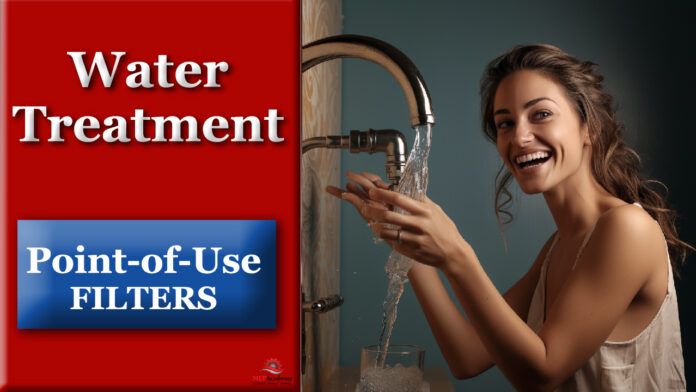Water Treatment Point-of-Use Filters. This is the first article in our series on the methods of water treatment for both the home and office. Access to clean and safe drinking water is a fundamental human right, yet water quality issues continue to be a concern in many regions.
If you prefer to watch the video version of this presentation than scroll to the bottom or click on the following link. Water Treatment Point-of-Use Filters
Point-of-Use filters have emerged as a convenient and effective solution to address this challenge. These innovative filters provide a simple but powerful means to purify water directly at the point of consumption, ensuring every drop you drink is free from contaminants. In this article, we explore the benefits and applications of Point-of-Use filters, and why they are becoming an indispensable tool for water treatment at home or at the office.
Checkout these Water Filters here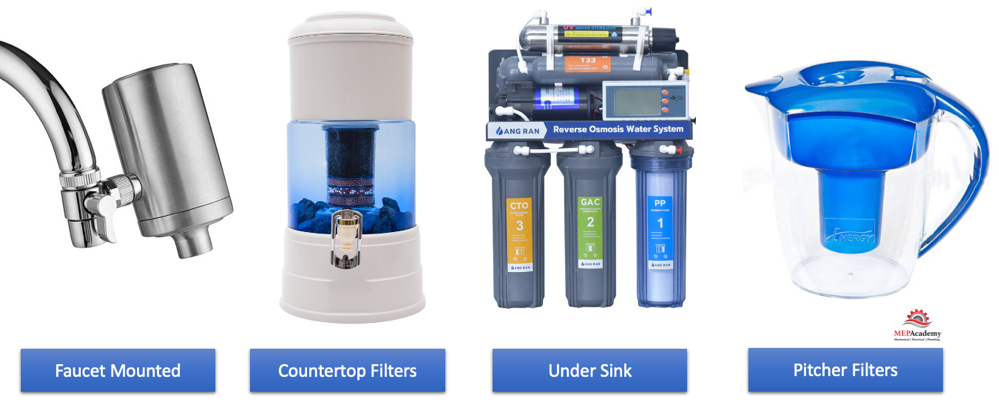
What Are Point-of-Use Filters?
Point-of-Use filters are compact devices designed to remove impurities from water at the specific point where it is consumed, such as kitchen sinks, faucets, or water dispensers. They are available in various forms, including faucet-mounted filters, countertop filters, under-sink systems, and pitcher filters. Each type offers unique advantages, catering to different user preferences and installation requirements. Checkout the latest Filters and their Pricing
How Do Point-of-Use Filters Work?
Most Point-of-Use filters use a combination of filtration technologies to effectively remove contaminants from water. Common methods include:
1. Activated Carbon Filtration: This technique involves using activated carbon to adsorb and trap contaminants like chlorine, volatile organic compounds (VOCs), pesticides, and bad tastes and odors.
2. Reverse Osmosis (RO) Filtration: RO filters employ a semi-permeable membrane to remove a wide range of impurities, including dissolved solids, heavy metals, fluoride, and bacteria.
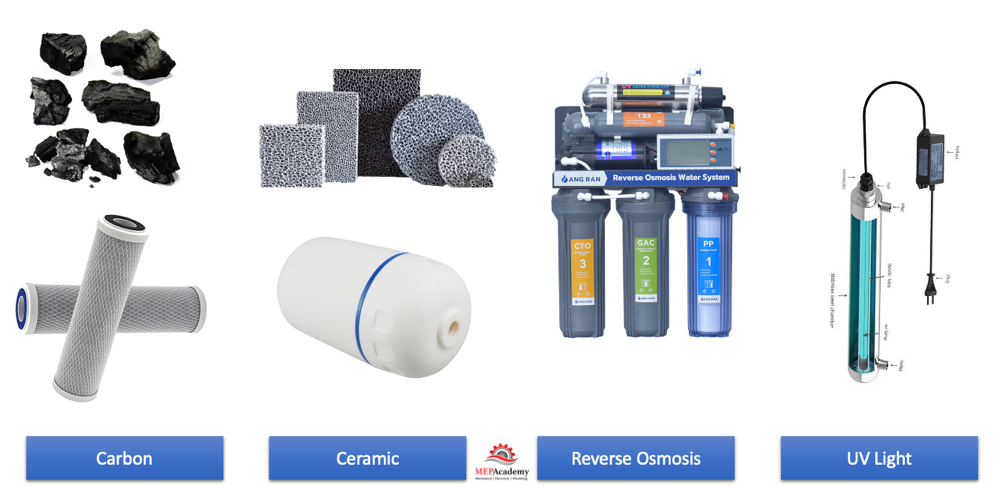
3. Ceramic Filtration: Ceramic filters have fine pores that can physically block larger particles, sediments, and bacteria.
4. UV Sterilization: UV filters use ultraviolet light to neutralize bacteria, viruses, and other microorganisms present in the water.
We’ll cover each of these different methods of water treatment in the following videos of this series.
Checkout these Water Filters hereApplications of Point-of-Use Filters:
1. Drinking Water: The most common application is for purifying drinking water, ensuring that your family consumes safe and clean water every day.
2. Cooking: Using filtered water in food preparation enhances the taste and quality of meals.
3. Beverage Making: Whether it’s making tea, coffee, or smoothies, using filtered water can significantly enhance the final product.
4. Baby Formula: Point-of-Use filters are especially beneficial for preparing baby formula, providing infants with the purest water possible.
Choosing the Right Point-of-Use Filter:
When selecting a Point-of-Use filter, consider factors such as your local water quality, filter type, filter life, maintenance requirements, and certifications. Look for filters certified by reputable organizations like NSF International to ensure their effectiveness and safety.
Point-of-Use (POU) filters offer several advantages and disadvantages as a water treatment solution. Understanding these factors can help individuals make informed decisions about whether POU filters are the right choice for their specific needs. Let’s explore the advantages and disadvantages:
Advantages:
1. Convenience: Point-of-Use filters are easy to install and require minimal plumbing modifications. They can be quickly attached to faucets, placed on countertops, or integrated under sinks, making them accessible and user-friendly.
2. Effective Contaminant Removal: POU filters can efficiently remove a wide range of impurities, including chlorine, sediment, heavy metals, volatile organic compounds (VOCs), bacteria, and viruses. Some models, such as Reverse Osmosis (RO) filters, can eliminate even more contaminants, providing high-quality water.
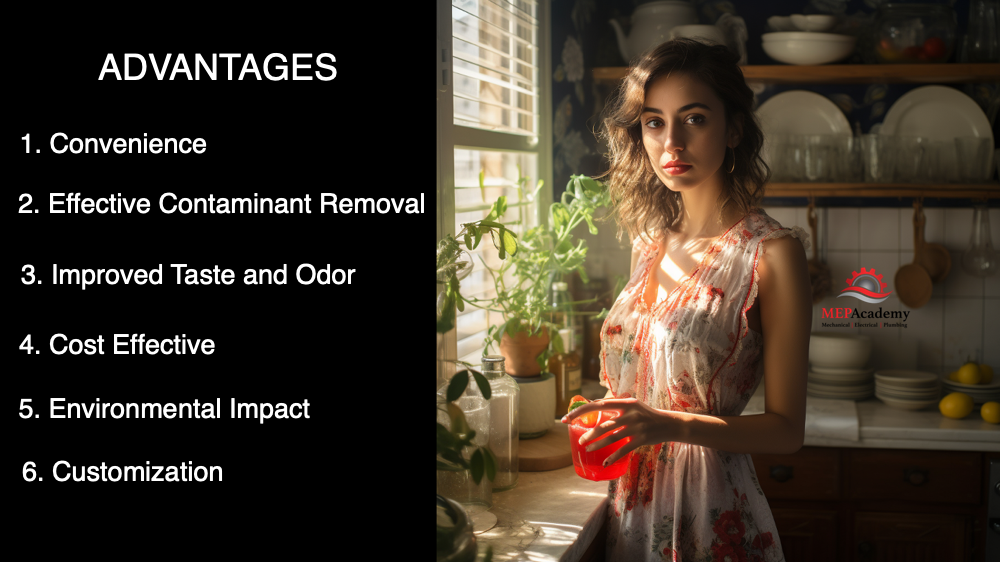
3. Improved Taste and Odor: By removing chlorine and other chemicals that affect the taste and odor of tap water, POU filters enhance the overall drinking experience, encouraging increased water consumption.
4. Cost-Effective: POU filters offer an economical alternative to purchasing bottled water regularly. Once installed, the filters require periodic replacement of cartridges or membranes, which can be more affordable in the long run compared to the recurring cost of bottled water.
5. Environmental Impact: By using POU filters and reducing reliance on bottled water, individuals contribute to the reduction of plastic waste and its impact on the environment.
6. Customization: With various types of POU filters available, users can select the filter that best suits their specific water quality concerns and preferences.
Checkout these Water Filters hereDisadvantages:
1. Limited Water Volume: Point-of-Use filters are designed for relatively low water flow rates. They are ideal for drinking and cooking water but may not be suitable for high-demand tasks like filling large containers or washing dishes.
2. Filter Replacement and Maintenance: POU filters require regular filter replacement or maintenance to ensure optimal performance. Neglecting this aspect may result in reduced filter effectiveness and compromised water quality.
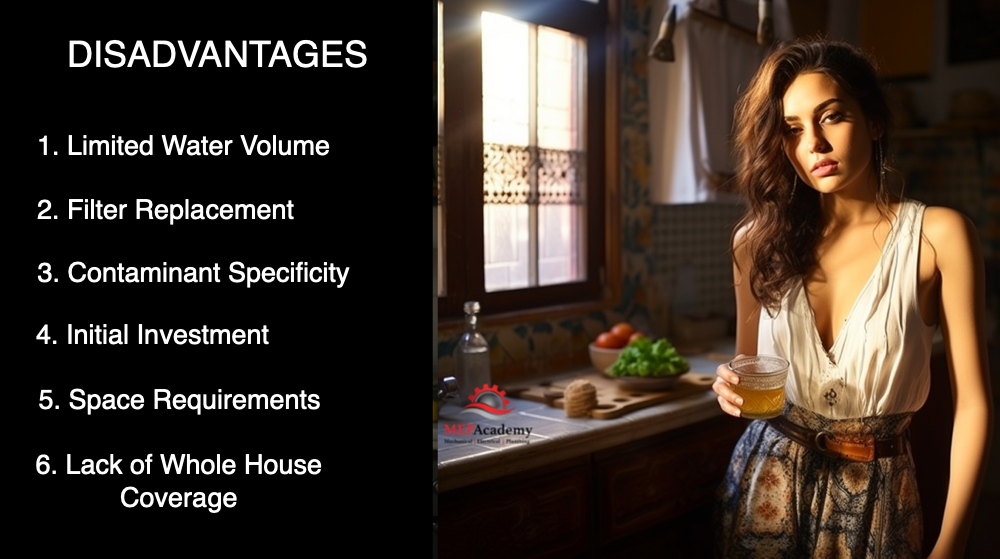
3. Contaminant Specificity: Different types of POU filters are effective against specific contaminants, but no single filter type can address all water quality issues. The choice of filter should be based on the specific contaminants present in the water.
4. Initial Investment: Some high-end POU filters, such as RO systems, may have a higher initial cost compared to basic carbon or ceramic filters. However, the long-term cost savings on bottled water can offset this initial investment.
5. Space Requirements: Under-sink or countertop POU filters may require some space, which could be a consideration for households with limited available space.
6. Lack of Whole-House Coverage: POU filters provide treatment only at specific points of water consumption, such as the kitchen sink. They do not address water quality concerns throughout the entire home.
Conclusion:
Point-of-Use filters have transformed the way we access clean water at home. By installing these effective water treatment devices, you can take control of your water quality, providing your family with the gift of pure, safe, and delicious drinking water. Embrace the power of Point-of-Use filters and create your oasis of clean water right at your fingertips.
Point-of-Use filters offer numerous advantages in terms of convenience, effectiveness, and cost-effectiveness. However, users should be mindful of their limitations, such as filter replacement and the need to address specific contaminants. For comprehensive water treatment throughout the entire home, users may need to consider whole-house water treatment systems. Ultimately, the choice of water treatment method should be based on the unique water quality needs and preferences of each household.


